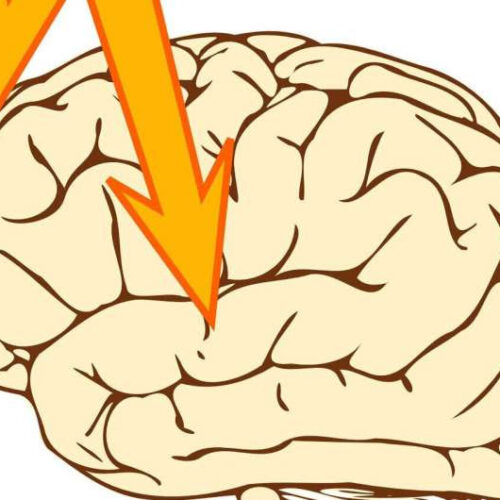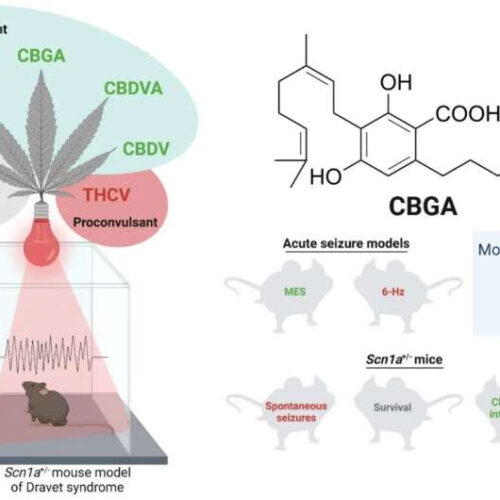by Josh Barney, University of Virginia Credit: Pixabay/CC0 Public Domain Researchers at the University of Virginia School of Medicine have uncovered how problems in cortical microcircuits in the brain can trigger epileptic seizures. The researchers say that targeting the problem could lead to new treatments for a devastating form of the disease. UVA epilepsy researchers Eric...
Tag: <span>seizures</span>
Scientists discover three rare cannabinoids reduce seizures in mice
by University of Sydney Cannabigerolic acid (CBGA), cannadivarinic acid (CBDVA), cannabidivarin (CBDV) and cannabigerovarinic acid (CBGVA) reduce seizures in a mouse model of intractable epilepsy. Credit: University of Sydney Research from pharmacologists at the University of Sydney provides new insights into how cannabis extracts may work to treat epilepsy. The study for the first time reports that...
Hallucinations in people with seizures may point to suicide risk
Researchers from Trinity College Dublin and the Royal College of Surgeons in Ireland (RCSI) have shown for the first time, the mental health significance of hallucinations in people with a history of seizures. In a study published today (Thursday, June 11th, 2020), findings show that 8% of individuals with a history of seizures report hallucinations,...
Treating Epilepsy with Stimulated Seizures
By Sara Ryding, B.Sc.Reviewed by Emily Henderson, B.Sc. Epilepsy is a common neurological disorder that affects 65 million people around the world. Despite being so common, it is generally not well understood and around one-third of those afflicted cannot control their condition with medication. One of the emerging ways to deal with epilepsy is to...
CBD medicine may help ease another form of seizure
by Amy Norton, Healthday Reporter The study involved 224 patients with tuberous sclerosis complex (TSC)—a genetic condition that affects about one in 6,000 people, according to the U.S. National Institutes of Health. It causes noncancerous tumors to arise throughout the body, and—in 90% of patients—seizures that are often resistant to standard drugs. (HealthDay)—Prescription-grade CBD may...
She lives with seizures, and public stigma, every day
by Serena Gordon, Healthday Reporter Eva Wadvinski Most of the time, Eva Wadvinski is a typical college student. Then suddenly, she isn’t. Wadvinski has epilepsy and has disruptive seizure clusters as often as 40 times a day. They’re not typical “Hollywood” seizures where people convulse (tonic-clonic seizures), making it harder for people to understand what...
Nerve stimulation and repetitive sounds help improve hearing
by American Physiological Society Combining seizure-preventing electrical stimulation with repetitive musical tones improves processing of sounds in the brain, according to new research. The discovery may provide relief for chronic ringing in the ears (tinnitus) and aid communication skills in people with autism. The first-of-its-kind study, published ahead of print in the Journal of Neurophysiology...
Do neurocysticercosis-related seizures lead to epilepsy?
by The City University of New York Neurocysticercosis, an infection of the brain with pork tapeworm larvae, is highly endemic in Sub-Saharan Africa, Latin America, and Asia, and increasingly common in developed countries like the U.S. due to immigration. The larvae form cysts in the brain, which can cause a variety of neurological symptoms, seizures...
Cannabis dosage studied at USask to reduce seizures in children with severe epilepsy
Posted Today Children with severe epilepsy also experienced improvements in their quality of life after taking low doses of the medicinal cannabis oil, according to research published in Frontiers in Neurology. The study tested the effects of medicinal cannabis oil with 95 per cent CBD, a chemical which does not create a high, and five percent THC,...
New research could help predict seizures before they happen
by RCSI A new study has found a pattern of molecules that appear in the blood before a seizure happens. This discovery may lead to the development of an early warning system, which would enable people with epilepsy to know when they are at risk of having a seizure. Researchers at FutureNeuro, the SFI Research Centre for Chronic and Rare Neurological Diseases, hosted...


